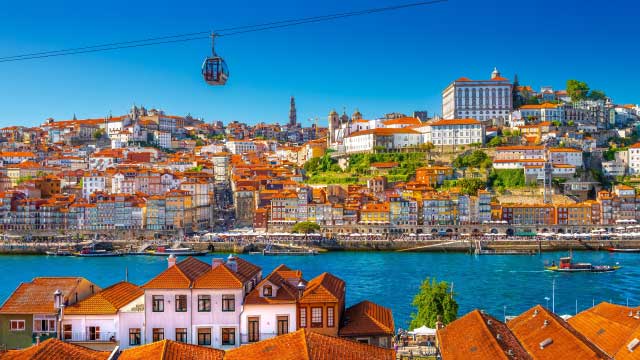finanças
How to get a mortgage in Portugal
Portugal is the place where your dream home can finally come to life – and we’re here to show you how to make it happen.

Thinking about buying a home in Portugal? Know that you’re not the only one. Portugal has become a favorite destination for those looking to start a new chapter, from its charming cities and stunning coastlines to the warm climate and friendly vibe.
In this guide, we’re delving into everything you need to know about securing a mortgage in Portugal. No complex jargon, just the essential information to empower you to confidently take the next step in your property purchase.
Can foreigners get a mortgage in Portugal?
Yes, foreigners can get a mortgage in Portugal. Whether you're from the EU or outside it, the process is similar to that for locals, though there are a few differences depending on your residency status. Generally, banks are pretty open to lending to foreign buyers, but you’ll need to meet specific eligibility requirements.
Types of Mortgages (Fixed, Variable, and Mixed Rates)
When applying for a mortgage in Portugal, you’ll encounter three main types of interest rates to choose from: fixed, variable, and mixed-rate mortgages. Here’s a breakdown of each option:
- Fixed-rate mortgages: these offer the peace of mind of knowing exactly how much you'll be paying each month, as your interest rate stays the same for the entire duration of the loan. This is ideal for those who want stability and predictability in their payments
- Variable-rate mortgages: these are often tied to the Euribor (European Interbank Offered Rate) and can fluctuate over time. This means your payments may go up or down depending on the market, which can be advantageous if interest rates decrease but risky if they rise
- Mixed-rate mortgages: a mixed-rate mortgage combines both fixed and variable rates. This option usually starts with a fixed-rate period (e.g., 5-10 years) and then switches to a variable rate for the remainder of the loan term. This option offers some flexibility, allowing borrowers to benefit from the stability of fixed rates initially while potentially saving money with variable rates later on.
The choice between fixed, variable, or mixed rates depends on your financial preferences and risk tolerance. Fixed rates provide stability, while variable rates can offer savings when interest rates fall. The mixed-rate option provides a middle ground for those looking for flexibility between the two.
Loan-to-value (LTV) ratios for residents vs. non-residents
The Loan-to-value (LTV) ratio is the percentage of the property’s value that the bank is willing to lend you. For residents, banks generally offer up to 90% LTV, meaning you'll need to put down at least 10% of the property price. For non-residents, the LTV can be slightly lower, typically ranging from 65% to 75%, meaning a larger down payment may be required.
Important note: keep in mind that loan requirements might vary depending on the bank, and certain banks may offer more favorable terms for residents or those with stronger financial profiles.
But there’s good news on this front! Keep reading.
Is a 100% mortgage available? (State Guarantee for young adults)
While 100% mortgages are not typically available for most buyers, some banks offer up to 100% financing to first-time buyers under the age of 35, especially if they have a strong financial profile and can demonstrate stable income.
Documents needed
You'll need a set of documents to prove your identity, income, and financial stability to apply for a mortgage in Portugal. Common documents include:
- A valid passport or ID card
- Proof of income (pay slips, tax returns)
- Bank statements from the last three months
- A Portuguese Tax Identification Number (NIF)
- Proof of employment or self-employment status.
Eligibility for foreigners
EU Citizens: simplified requirements
The requirements are similar to those for Portuguese residents, but you’ll still need to provide the necessary documentation and meet the LTV ratios set by the banks.
Non-EU Citizens: higher deposits & extra documentation
The process might be a bit more complicated if you're from outside the EU, but the documentation and the down payment requirements are largely the same for all nationalities. You may need to provide additional documentation, such as proof of employment, income, and a clean credit history.
Step-by-step application process
Although it is a straightforward process, it can still take some time. Here’s a general overview of the steps involved:
1. Get pre-approval: the first step is to get pre-approval for your mortgage. This involves providing essential information to the bank, such as your income, the amount you wish to borrow, and the property you want to buy
2. Submit documents: once you're pre-approved, you'll need to submit your full application with all required documentation (ID, proof of income, bank statements, etc.)
3. Property valuation: the bank will carry out a property valuation to ensure the property is worth the loan amount. This process can take a few weeks
4. Mortgage offer: once the bank approves your application and the property valuation is complete, you’ll receive a formal mortgage offer, which you’ll need to sign. Note: After pre-approval, there is always a second approval after reviewing your submitted documents
5. Completion: the final step is completing the purchase. Once the mortgage is officially approved, you'll sign the contract, and the bank will release the funds for the property purchase."
.
Want to get an idea of how much you can borrow? Check out our article to see the step-by-step process on how to calculate your mortgage.

Costs beyond the mortgage
Taxes (IMT, Stamp duty, IMI)
IMT (Property Transfer Tax): based on the purchase price and can range from 2% to 8.8%, depending on the value of the property
Stamp duty: typically 0.8% of the purchase price
IMI (Property Tax): an annual tax that ranges from 0.3% to 0.8% depending on the location and value of the property.
Notary fees, insurance, and bank fees
Notary fees, insurance, and bank fees are also part of the costs involved. You’ll need to pay for life insurance to protect the bank’s investment, and notary fees vary depending on the property's value. Additionally, banks may charge administrative fees (such as the commission for formalizing the mortgage) for processing your mortgage application. However, banks cannot charge a management commission (comissão de gestão), which is legally prohibited.
Applying for a mortgage in Portugal? 3 important tips
Start the process early: the mortgage application process can take time, especially for non-residents. Starting early will give you ample time to gather all the necessary documents
Work with a mortgage broker: a broker can help navigate the system and ensure you're getting the best deal for your circumstances
Have sufficient funds: be prepared to show you have enough savings to cover the down payment, taxes, and additional costs.
Frequently asked questions on how to get a mortgage in Portugal
Do I need a Portuguese bank account?
Yes, to secure a mortgage, you’ll typically need a Portuguese bank account to make payments and handle transactions.
Can I get a mortgage with a freelance income?
Yes, but you’ll need to provide additional documentation, such as tax returns and bank statements for the past three years, to prove your income stability.
Do Portuguese banks accept co-signers from outside the EU?
Yes, some banks will accept co-signers from outside the EU, but they will likely require additional paperwork.
Can I rent out the property while paying off the mortgage?
Yes, you can rent out your property, but keep in mind that rental income may not always be considered in the mortgage affordability calculation. This condition may vary depending on the bank, so be sure to check the terms with your lender.
Can I refinance my mortgage in Portugal as a foreigner?
Yes, you can refinance your mortgage in the future, but it will depend on the bank and your financial situation at that time.
The information provided isn’t a substitute for consulting public or private experts in each area.



